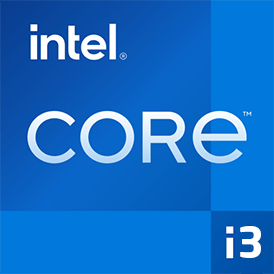
Intel Core i3-4370 Benchmark, Test and specs
Last updated:
The Intel Core i3-4370 was released in Q3/2014 and has 2 cores. The processor can process 4 threads simultaneously and uses a mainboard with the socket LGA 1150. In the Geekbench 5 benchmark, the Intel Core i3-4370 achieved a result of 904 points (single-core) or 2,071 points (multi-core).

| Name: | Intel Core i3-4370 |
|---|---|
| Family: | Intel Core i3 (205) |
| CPU group: | Intel Core i 4000 (64) |
| Architecture: | Haswell S |
| Segment: | Desktop / Server |
| Generation: | 4 |
| Predecessor: | -- |
| Successor: | -- |
CPU Cores and Base Frequency
The Intel Core i3-4370 has 2 cores. The clock frequency of the Intel Core i3-4370 is 3.80 GHz. An initial performance assessment can be made using the number of CPU cores.
| CPU Cores / Threads: | 2 / 4 |
|---|---|
| Core architecture: | normal |
| Cores: | 2x |
| Hyperthreading / SMT: | Yes |
|---|---|
| Overclocking: | No |
| Frequency: | 3.80 GHz |
| Turbo Frequency (1 Core): | -- |
| Turbo Frequency (2 Cores): | -- |
Internal Graphics
The Intel Core i3-4370 has an integrated graphics that the system can use to efficiently play back videos. The Intel Core i3-4370 has the Intel HD Graphics 4600 installed, which has 20 streaming multiprocessors (160 shaders).
| GPU name: | Intel HD Graphics 4600 |
|---|---|
| GPU frequency: | 0.35 GHz |
| GPU (Turbo): | 1.15 GHz |
| Compute units: | 20 |
| Shader: | 160 |
| Hardware Raytracing: | No |
| Release date: | Q2/2013 |
| Max. displays: | 3 |
|---|---|
| Generation: | 7.5 |
| Direct X: | 11.1 |
| Technology: | 22 nm |
| Max. GPU Memory: | 2 GB |
| Frame Generation: | No |
Hardware codec support
Processors with integrated graphics can process video codecs faster. Support for modern codecs can significantly increase system efficiency during video playback.
| h265 / HEVC (8 bit): | No |
|---|---|
| h265 / HEVC (10 bit): | No |
| h264: | Decode / Encode |
| VP8: | No |
| VP9: | No |
| AV1: | No |
|---|---|
| AVC: | Decode / Encode |
| VC-1: | Decode |
| JPEG: | Decode |
Memory & PCIeThe Intel Core i3-4370 supports a maximum of 32 GB memory. Depending on the mainboard, the processor can use a maximum of 2 (Dual Channel) memory channels. This results in a maximum bandwidth of the main memory of 25.6 GB/s. |
|
| Memory type: | Memory bandwidth: |
|---|---|
| DDR3-1600 | 25.6 GB/s |
| Max. Memory: | 32 GB |
| Memory channels: | 2 (Dual Channel) |
| ECC: | Yes |
| PCIe: | 3.0 x 16 |
| PCIe Bandwidth: | 15.8 GB/s |
Thermal ManagementThe Intel Core i3-4370 has a TDP of 54 W. Based on the TDP, the system manufacturer can and must adapt the cooling solution to the processor. |
|
|---|---|
| TDP (PL1 / PBP): | 54 W |
| TDP (PL2): | -- |
| TDP up: | -- |
| TDP down: | -- |
| Tjunction max.: | -- |
Technical details
Modern production reduces the waste heat of a processor and increases its efficiency. The Intel Core i3-4370 is made in 22 nm and has 4.00 MB cache.
| Technology: | 22 nm |
|---|---|
| Chip design: | Monolithic |
| Socket: | LGA 1150 |
| L2-Cache: | -- |
| L3-Cache: | 4.00 MB |
| AES-NI: | Yes |
| Operating systems: | Windows 10, Linux |
| Virtualization: | VT-x, VT-x EPT, VT-d |
|---|---|
| Instruction set (ISA): | x86-64 (64 bit) |
| ISA extensions: | SSE4.1, SSE4.2, AVX2 |
| Release date: | Q3/2014 |
| Release price: | 147 $ |
| Part Number: | -- |
| Documents: | Technical data sheet |
Rate this processor
Benchmark results

The benchmark results for the Intel Core i3-4370 have been carefully checked by us. We only publish benchmark results that have been created by us or that have been submitted by a visitor and then checked by a team member. All results are based on and fullfill our benchmark guidelines.
Geekbench 5, 64bit (Single-Core)
Geekbench 5 is a cross plattform benchmark that heavily uses the systems memory. A fast memory will push the result a lot. The single-core test only uses one CPU core, the amount of cores or hyperthreading ability doesn't count.

|
Intel Core i7-4770R
4C 8T @ 3.90 GHz |
||

|
Intel Xeon E5-2618L v3
8C 16T @ 3.40 GHz |
||

|
AMD Ryzen 7 2700E
8C 16T @ 4.00 GHz |
||
|
|
Intel Core i3-4370
2C 4T @ 3.80 GHz |
||

|
Intel Xeon Gold 5118
12C 24T @ 3.20 GHz |
||

|
Intel Xeon Gold 5119T
14C 28T @ 3.20 GHz |
||

|
Intel Xeon E5-2678 v3
12C 24T @ 3.30 GHz |
||
Geekbench 5, 64bit (Multi-Core)
Geekbench 5 is a cross plattform benchmark that heavily uses the systems memory. A fast memory will push the result a lot. The multi-core test involves all CPU cores and taks a big advantage of hyperthreading.

|
Intel Pentium Gold G5400
2C 4T @ 3.70 GHz |
||

|
Intel Core i3-7100
2C 4T @ 3.90 GHz |
||

|
Intel Celeron N5105
4C 4T @ 2.60 GHz |
||
|
|
Intel Core i3-4370
2C 4T @ 3.80 GHz |
||

|
Intel Core i5-7267U
2C 4T @ 3.50 GHz |
||

|
Intel Core i3-6100
2C 4T @ 3.70 GHz |
||

|
MediaTek Kompanio 900T
8C 8T @ 2.40 GHz |
||
Geekbench 6 (Single-Core)
Geekbench 6 is a benchmark for modern computers, notebooks and smartphones. What is new is an optimized utilization of newer CPU architectures, e.g. based on the big.LITTLE concept and combining CPU cores of different sizes. The single-core benchmark only evaluates the performance of the fastest CPU core, the number of CPU cores in a processor is irrelevant here.

|
Intel Core i5-4690
4C 4T @ 3.90 GHz |
||

|
Intel Core i5-6585R
4C 4T @ 3.60 GHz |
||

|
Intel Core i5-7260U
2C 4T @ 3.40 GHz |
||
|
|
Intel Core i3-4370
2C 4T @ 3.80 GHz |
||

|
Intel Xeon Silver 4208
8C 16T @ 3.20 GHz |
||

|
Intel Core i5-9500T
6C 6T @ 3.70 GHz |
||

|
Intel Xeon Gold 6142
16C 32T @ 3.70 GHz |
||
Geekbench 6 (Multi-Core)
Geekbench 6 is a benchmark for modern computers, notebooks and smartphones. What is new is an optimized utilization of newer CPU architectures, e.g. based on the big.LITTLE concept and combining CPU cores of different sizes. The multi-core benchmark evaluates the performance of all of the processor's CPU cores. Virtual thread improvements such as AMD SMT or Intel's Hyper-Threading have a positive impact on the benchmark result.

|
Intel Core i7-3720QM
4C 8T @ 2.60 GHz |
||

|
Qualcomm Snapdragon 7c+ Gen 3
8C 8T @ 2.40 GHz |
||

|
Intel Core i7-2600K
4C 8T @ 3.80 GHz |
||
|
|
Intel Core i3-4370
2C 4T @ 3.80 GHz |
||

|
Intel Core i5-4460T
4C 4T @ 2.30 GHz |
||

|
Intel Core i3-7100
2C 4T @ 3.90 GHz |
||

|
Intel Core i5-7267U
2C 4T @ 3.50 GHz |
||
iGPU - FP32 Performance (Single-precision GFLOPS)
The theoretical computing performance of the internal graphics unit of the processor with simple accuracy (32 bit) in GFLOPS. GFLOPS indicates how many billion floating point operations the iGPU can perform per second.

|
AMD A8-5550M
AMD Radeon HD 8550G @ 0.72 GHz |
||

|
AMD A8-5557M
AMD Radeon HD 8550G @ 0.72 GHz |
||

|
AMD A8-6500T
AMD Radeon HD 8550D @ 0.72 GHz |
||
|
|
Intel Core i3-4370
Intel HD Graphics 4600 @ 1.15 GHz |
||

|
Intel Core i3-4370T
Intel HD Graphics 4600 @ 1.15 GHz |
||

|
Intel Core i3-4170T
Intel HD Graphics 4400 @ 1.15 GHz |
||

|
Intel Core i5-4200H
Intel HD Graphics 4600 @ 1.15 GHz |
||
Estimated results for PassMark CPU Mark
Some of the CPUs listed below have been benchmarked by CPU-monkey. However the majority of CPUs have not been tested and the results have been estimated by a CPU-monkey’s secret proprietary formula. As such they do not accurately reflect the actual Passmark CPU mark values and are not endorsed by PassMark Software Pty Ltd.

|
Intel Core i5-7267U
2C 4T @ 3.50 GHz |
||

|
Intel Core i7-6567U
2C 4T @ 3.00 GHz |
||

|
Intel Core i5-6287U
2C 4T @ 3.30 GHz |
||
|
|
Intel Core i3-4370
2C 4T @ 3.80 GHz |
||

|
Intel Pentium Gold G5500
2C 4T @ 3.80 GHz |
||

|
Intel Pentium Gold G5420
2C 4T @ 3.80 GHz |
||

|
Intel Core i3-7100T
2C 4T @ 3.40 GHz |
||
Cinebench R15 (Single-Core)
Cinebench R15 is the successor of Cinebench 11.5 and is also based on the Cinema 4 Suite. Cinema 4 is a worldwide used software to create 3D forms. The single-core test only uses one CPU core, the amount of cores or hyperthreading ability doesn't count.

|
Intel Core i7-5775R
4C 8T @ 3.80 GHz |
||

|
Intel Core i7-6700T
4C 8T @ 3.60 GHz |
||

|
Intel Xeon E5-2687W v2
8C 16T @ 4.00 GHz |
||
|
|
Intel Core i3-4370
2C 4T @ 3.80 GHz |
||

|
Intel Core i7-4980HQ
4C 8T @ 4.00 GHz |
||

|
Intel Core i3-8109U
2C 4T @ 3.60 GHz |
||

|
Intel Core i5-7360U
2C 4T @ 3.60 GHz |
||
Cinebench R15 (Multi-Core)
Cinebench R15 is the successor of Cinebench 11.5 and is also based on the Cinema 4 Suite. Cinema 4 is a worldwide used software to create 3D forms. The multi-core test involves all CPU cores and taks a big advantage of hyperthreading.

|
Intel Core i3-6100
2C 4T @ 3.70 GHz |
||

|
Intel Pentium G4600
2C 4T @ 3.60 GHz |
||

|
AMD Athlon 3000G
2C 4T @ 3.50 GHz |
||
|
|
Intel Core i3-4370
2C 4T @ 3.80 GHz |
||

|
Intel Pentium Gold G5400
2C 4T @ 3.70 GHz |
||

|
Intel Core i5-7360U
2C 4T @ 3.60 GHz |
||

|
Intel Pentium G4560
2C 4T @ 3.50 GHz |
||
Benchmarks

Geekbench 5 (SC)
2,488 entries
2,488 entries

Geekbench 5 (MC)
2,461 entries
2,461 entries

Geekbench 6 (SC)
1,755 entries
1,755 entries

Geekbench 6 (MC)
1,703 entries
1,703 entries

FP32 SP (iGPU)
2,042 entries
2,042 entries

PassMark CPU-Mark
2,392 entries
2,392 entries

Cinebench R15 (SC)
1,106 entries
1,106 entries

Cinebench R15 (MC)
1,101 entries
1,101 entries

Geekbench 3 (SC)
942 entries
942 entries

Geekbench 3 (MC)
938 entries
938 entries

Cinebench R11.5 (SC)
825 entries
825 entries

Cinebench R11.5 (MC)
836 entries
836 entries

Cinebench R11.5 iGPU
383 entries
383 entries
Popular comparisons
back to index





